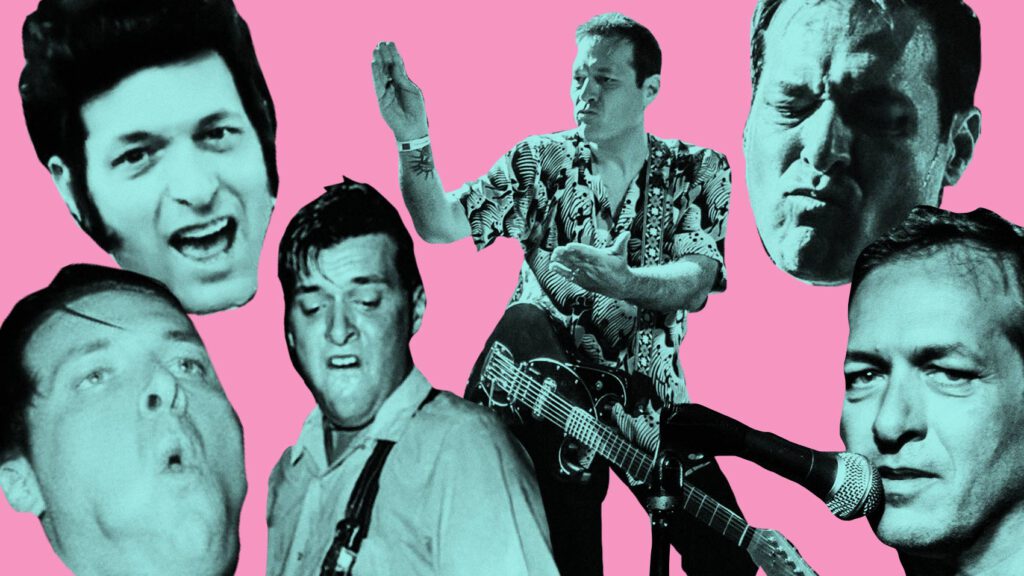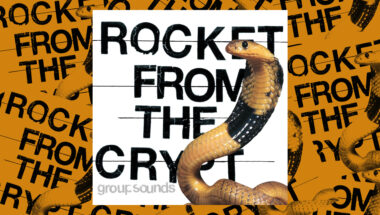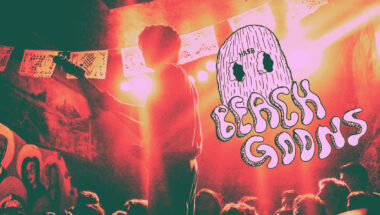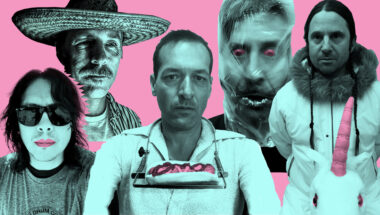“Amateurs sit and wait for inspiration,” Stephen King once wrote. “The rest of us just get up and go to work.” In that spirit, Riot Fest’s anthology series Autodiscography celebrates the tireless work ethic, versatility, and imagination required of our favorite prolific musicians. For today’s installment, we find religion with San Diego’s preeminent rock ‘n’ roll swami, John “Speedo” Reis.
For over 30 years, The Slasher has constantly updated his résumé (and aliases), quite possibly as part of a quest to fill James Brown’s hardest-working man in show business-sized shoes. He’s entertained a global cult of devotees with brass-bolstered, sharp-dressing throwbacks Rocket From the Crypt, legendary post-hardcore daredevils Drive Like Jehu, and deliciously snackable combination thereof, Hot Snakes. The latter’s long-awaited fourth album, Jericho Sirens—its first in 14 years—was released by Sub Pop last March. While those three bands are certainly the best-known in Reis’ catalog, he’s also explored surf, garage, proto-punk, and much more with the likes of Swami John Reis & the Blind Shake, the Night Marchers, Sultans, Back Off Cupids, and Jehu/Snakes precursor Pitchfork, the first of three utterly killer projects with high school buddy and fellow singer/guitarist Rick Froberg.
John Reis is also incredibly generous: RFTC’s Tattoo Club assured free admission to anyone with ink of the band’s logo, until their heavily in-demand 2013 reunion dates. Speedo is the consummate showman: I once witnessed a woman screaming, “We love you!” in between RFTC songs, to which he immediately quipped, “Thank you, thank you… we love your money!” The Swami is busy as ever, running longtime boutique label Swami Records. All the while, The Slasher is contemplating new Rocket and Jehu records (!), and, yes, gearing up for this year’s Riot Fest in Chicago with Hot Snakes. We talked to all of them.
Ready for the wild sound to take you away? Hit play on the playlist, and read on.
As a kid, I felt left in the dust with the wreckage of what was left of punk rock
CONSERVATIVE ITCH
1986-1990
RIOT FEST: I recently caught the It’s Gonna Blow!!! documentary about San Diego’s underground scene from the mid-’80s to the mid-’90s, and got curious about your first band, Conservative Itch. The only YouTube footage appears to be a minute and a half of a house show from 1986, which is right around the time you formed Pitchfork.
JOHN REIS: I think that was from ’85. I mean, I say that just because Pitchfork did start, like, around the end of ’86. Time moves a lot faster now than it did then; but yeah, a lot changed in that year. I remember it being quite a bit of time before… at least it felt like a bit of time before Pitchfork had started.
I ask because it seems like such an outlier in your catalog. Were you ever tempted to explore playing hardcore again?
[Pauses] Well… no. I consider the music I play now similar to the way it’s always been. I never look at it as really being that much different, in terms of specifying what kind of music it was. It feels the same. I know it does sound a bit different. It’s changed over time, but that has more to do with changing as a musician.
But as far as hardcore, when I was a kid, it was not only my favorite music… it was my identity. Being into punk rock music was definitely who I was, what I identified with. In San Diego, specifically—where I still live—it became pretty violent. Going to shows and stuff was kind of dangerous. You could get the shit kicked out of you, really for nothing. It was other people into punk [that were] kind of responsible for this violence. I think to move away from that, it was… not so much not digging the music, but getting older and not wanting to subject myself to that. I actually was into the music. I wasn’t into the spectacle. I wasn’t into the violence.
Also, metal was starting to creep into punk, and I didn’t really identify with heavy metal music at all. I always looked at punk being the antithesis of it, you know? I was against the posturing. I was against the whole notion of worshipping false idols [laughs], which heavy metal kind of is to a certain degree. I didn’t really dig it. A lot of my favorite bands had broken up by the time I even got into it, or had moved on themselves.
Die Kreuzen, who was my favorite band, had evolved and stopped playing the kind of music that I’d fallen in love with. And lot of bands were doing the same thing—expanding and changing. As a kid, I felt left in the dust with the wreckage of what was left of punk rock.
PITCHFORK
1986-1990
When you started playing with Rick Froberg in high school, did any part of you imagine you’d collaborate with him on and off for the next 30 years?
Well, of course not. I mean, I always knew I wanted to play music. It was very clear in my mind that this was something I was always going to do… but to what extent, I didn’t know. When we started playing, I couldn’t even imagine putting out a record. Playing a show seemed like such a big deal.
Just the ability to play a show—that seemed like an incredible feat in and of itself. Hence, playing house parties. I think that’s where Conservative Itch was playing. It wasn’t in a house; it was a carport, specifically, so… [laughs]. I wasn’t really even concerned with the future.
There’s a clear through-line from Pitchfork to Drive Like Jehu to Hot Snakes. It seems like your musical identity was pretty fully-formed out of the gate, although I’m sure you wouldn’t feel the same way.
Yeah, Pitchfork [was] a band for a while before Rick even [joined]. We played as a three-piece, pretty much an instrumental band. None of the songs made it onto the record [1990’s Eucalyptus]. We had a whole different set of material. We had maybe three sets before we recorded our first 7-inch and our first record. It’d gone through some changes. I think when we started, it was still in the vein of being very much influenced by the hardcore stuff.
Was there a point, after Pitchfork Media came out in 1995, that you thought, “Holy shit, this could be a reference to my obscure high school band?”
I don’t know if it’s a reference to it.
It’s not. It’s a reference to Tony Montana’s tattoo in Scarface.
Yeah, I don’t know anyone who works there. I don’t know anything. You’d have to think that they knew about the band, whether it was brought to their attention later or at some point, like, “Hey, there was a band [with the same name].” But I really don’t know that much about the website or anything. I know they review records and stuff like that. I’ve never assumed that they got the name from the band.
There’s no room for math in rock ‘n’ roll.
ROCKET FROM THE CRYPT
1989-2005, 2011, 2013-Present
Your voice appears sporadically on both Drive Like Jehu albums. When you decided that you wanted to be a frontman, was having a larger than life persona a determining factor?
No, not really. I think it was just more like, I had these other songs, and it was a return to rock ‘n’ roll and punk rock music, and a return to the bands that I grew up listening to that I loved. Like the Ramones, and the Saints—those were two really big influences. I remember the band the Didjits had come out with their second record, [1998’s] Hey Judester, and that reminded me, like, “Wow, yeah, I want to be doing this. I want to be exploring rock ‘n’ roll music again. I still have a heart that beats for that.”
When Rocket started, it was definitely about playing with friends and getting out of San Diego. We wanted to get out and use this thing as a vehicle to see the world and meet people. I was seeing a lot of my peers come through town, kids from all over, touring and playing music. For Rocket, from the get-go, it was always about putting this thing together and going around and seeing what exists beyond our sleepy fishing village.
I always thought so many of your lyrics were about the mythology and the history of rock ‘n’ roll.
I still really identify and connect with rock ‘n’ roll music. I consider Hot Snakes to be a rock ‘n’ roll band, as does everyone else in the band. It’s there, you know? It’s not the only music that I listen to, but I hear it in a lot of the music I listen to that isn’t even necessarily rock ‘n’ roll—the template, you know? I consider early rock ‘n’ roll music to be the DNA of my approach to guitar playing. I just try to do something different with it; something that’s exciting to me, and sounds expressive of what I’m about.
But as far as doing that larger than life persona, I think a lot of that has to do with… that’s part of me, too. It might not be me all the time, but it’s not all tongue-in-cheek. It’s just how we are as people. We’re not all one way the whole way.
On all the time.
Yeah. It’s all in there. It can be confusing. But people can be confusing, too.
Related: How many total outfits did Rocket have?
Okay… I’m not gonna be able to know exactly, but let me think. [Counts aloud for 25 seconds] Man, I guess it would probably be around 12 to 15.
I imagine that costs a little bit of money, to design unique apparel for different tours, videos.
Well, we try to be really resourceful. We go into the fabric store and buy some stuff that we think looks cool, [laughs] and we take it to someone who can make some stuff for us. Or sometimes, we buy existing things and customize them.
Yeah, it’s actually kind of stressful now, when I think about Rocket playing. I’m always like, “Fuck, what are we gonna wear?” I think we should be in our underwear or something. It’s not only coming up with something: it’s coming up with something that all six of us can agree on. And that is a rarity.
How much material is left for [long-running compilation series] All Systems Go 4? 5?
I don’t know about 5; there’s definitely enough for 4. Problem is, I’m not very good at archiving stuff, so I don’t know where a lot of the material is. There’s a few songs off [1995’s] Scream, Dracula, Scream… a couple of singles that haven’t been compiled before. There’s enough. There definitely is enough. I just don’t know where it all is.
I think for Rocket right now, instead of thinking about excavating the vault, it’s better to look to the future and just marinate on what a new Rocket From the Crypt record would sound like. I’d rather just think about that.
Ever do the math on how much money you lost doing the Tattoo Club?
You know, I’ve never done that, period… let alone on that. I shy away. [Laughs] No, there’s no math. There’s no room for math in rock ‘n’ roll. We’ve always just done things in a way that we would appreciate if someone else did them. If one of our favorite bands came through and did a whole tour of shows for free, that’d be so cool. We could afford to do it, so we did that.
It was all done in that manner, you know? “What would be cool? What would be badass?” It wasn’t so much necessarily giving back to the fans. It wasn’t like we were trying to endear ourselves to people by giving them free stuff. It was more like, we did it because it made us feel good.
I saw it like:
‘Man, this thing’s going somewhere.It might not be somewhere good,
but it’s going somewhere.’
DRIVE LIKE JEHU
1990-1995, 2014-2016
HOT SNAKES
1995-2005, 2011-Present
Have you ever meet a person who has a tattoo of all your projects?
I have met a couple people, sure.
Extraordinarily devoted.
Yeah, there are those people out there. And a lot of people that I’ve met through playing in the bands over the years, I’ve become friends with.
Even though Interscope was interested in both Jehu and Rocket, does any part of you feel like you pulled off a Trojan horse getting a band that discordant and off the wall onto a major?
No, not at all. Drive Like Jehu was the band that they were most interested in. They didn’t even know Rocket From the Crypt existed. Anna Statman—who worked at Interscope, and Slash before that—would come out to our shows when we played in the L.A. area. She was the very first person—major label or not, even indie label… anyone—who’d show interest in the band, in terms of wanting to put out our records and stuff. So, yeah, I don’t feel that it was a big feat.
It was also the times, too. Everybody was getting signed by major labels. They were signing buskers—just anyone on the street. They came to San Diego like locusts and devoured the scene and signed everyone. And it wasn’t a bad thing—seeing your friends getting a little bit of money to make the record they wanted to make, or be able to take a shot. I look back on it all as being really positive. I don’t think anyone got massively dicked over. It was just a bunch of friends playing in bands together.
In many ways, it was one of the best times in my life. If bands didn’t want to be on a fucking major label, they didn’t have to be, know what I mean? Nobody was twisting anyone’s arm.
Like, that movie you mentioned—it painted the town as being divided by this phenomenon, and it wasn’t really like that. It was a bunch of friends that supported each other, and enjoyed each other’s music and support and camaraderie. I didn’t really see the plot for that movie. That wasn’t my experience. For us, we were on a small label [Cargo/Headhunter] based in San Diego; we didn’t really want to be on that label, and I worked there. I was just like, “Man, we’ll never get anywhere on this label.” We had this idea to go and make this record and they were like, “Well, we can’t pay for that or this,” so it was like, “Okay, that’s not happening.” I didn’t really want special treatment, per se, but I saw it as having a future, like, “Man, this thing’s going somewhere.” [Laughs] It might not be somewhere good, but it’s going somewhere.
For what it’s worth, the majors were signing pretty adventurous artists at the time. Hot Snakes is arguably your most popular band next to Rocket, featuring some of the same personnel as Jehu. Why do you think it’s resonated more than Jehu did the first time around?
I don’t know. I don’t know if it did, or if it has, or why it’s resonated more. I don’t know. [Pause] Well, one thing, from someone who plays in both bands: When Drive Like Jehu got back together, it was obviously a reunion tour. We didn’t play for years and years, in years; then we got back together and relearned this material that we did when we were much younger people.
With Hot Snakes, even when we started playing, it didn’t seem as much like a reunion. We didn’t have to relearn, or channel some ancient god [laughs] in order to execute the songs the way that they were intended. It just seems like [Hot Snakes] has probably weathered a little better, musically.
That said, when Drive Like Jehu got back together, I thought we played really good. There was a certain point where it was like, “Okay, this is as good as it ever was.” I know the context is different, because it was a little more like the band was happening in a vacuum back when we started, at least in San Diego. There were’t that many similar bands at the time.
Later on, everyone started listening to more of the same stuff and being exposed to similar influences. Then you started hearing a thread running through this town a bit. I think of the early Jehu tours that we did: We would clear the room—we really would. We’d hit the stage and there’d be 50 people; and by the time we were done, there’d be 20. [Actually] it’s not “clear the room”—it was “push people back.” Just push them right back against the wall. It wasn’t for everybody, you know?
I really don’t think about it that much in terms of why things are the way they are. I’m really not interested in it. But specifically for Hot Snakes, doing this new record felt just like that sound [that’d] been in my head the whole time. So picking up a guitar, plugging it into an amp, and pressing record just seemed like picking up where I’d left off in my head. I didn’t have to go back and think about what a Hot Snakes would sound like. Getting back together and doing a Drive Like Jehu record—although we’ve talked about it—the band kind of unraveled rather quickly, unfortunately… which brought about recording the Hot Snakes record and focusing on that.
I’m always writing.
I’m always playing.I’m always listening to music and thinking,
‘What next?’
THE NIGHT MARCHERS
2007-Present
SWAMI RECORDS
2002-Present
From Sultans to Night Marchers to Back Off Cupids, which of your lesser-known bands do you think, in retrospect, deserved a bigger audience?
Well, the Night Marchers… I took some time off from playing, so it was kind of like, “Man, I really want to get these songs and play them.” So, I put the band together around Jason [Kourkounis, ex-Hot Snakes drummer] and myself. Night Marchers was born out of that. I thought it was received quite well—especially the second record [2013’s Allez Allez], people seemed to really enjoy it.
A lot of people didn’t know about the band, really, and we didn’t tour a whole lot. It’s hard to go and tour the country without the financial ability to get to your next show. It became one of those bands, picking our spots here and there with a couple shows… what we could afford to do. I run into people who don’t know about the band, but I put it on myself. It’s not that I don’t care, but I’m more into just making the music and making the records. I generally think that people will find out about it somehow. It’s there, you know?
I don’t know if this is something you’ve done already—like at your own place, Bar Pink—but logistics permitting, ever give any thought to a one-off show where, say, four of your bands played?
I don’t know if I have the mental capacity to remember all those songs in one night. There was the intention for Rocket, Hot Snakes, and Drive Like Jehu to all play a show in England a couple years ago that didn’t end up happening. Not all in the same night—like three nights. It’d be a fun thing to do, but it also seems a little narcissistic, too. Night Marchers did a show with Hot Snakes once before. I think that happened.
You played a three-day residency in L.A. with Ceremony last year. Are there any other current bands you’d like to guest with—Swami or otherwise?
I am really excited to hear that Ceremony is gonna be working on a new record. I’m gonna be producing it, so I’m really psyched on that. That’ll be fun—I can’t wait to hear what they come up with. There’s been talk about doing a record with Metz—I did a single, a 7-inch with them. I’d written a bunch of songs to collaborate [on] with someone, and it didn’t end up happening, so I do have some things that I’m interested in doing. We’ll see, you know?
I’m really into playing with Hot Snakes right now. Eventually, I think I’ll find the right person to collaborate with and do something—it just has to be that right person. Something where there’s a reaction that creates a new sound that’s beyond something I have in my head right now. A muse, you know? I believe in that. I believe that person’s out there.
How does your average week break down these days, say, between your time running Swami, practicing and playing out, and just being a dad? Is it harder maintaining this pace the older you get?
No, it’s nice to have things to do. [Laughs] Without that, it would be hard. [It’d be hard] without having the life I have here in San Diego to balance out the art and regenerate what I do musically. It’s been the basis of my ability to be creative. So, I mean, average week—well, okay, I tend to tour—at least right now—about two weeks out of every two months.
So, I’m here in San Diego quite a bit. And when I’m here, I have an 11-year-old son, his name is Tiger. We go out and we party hard. [Laughs] We do all the things there is to do here in San Diego and take advantage of… I mean, I love this city so much, and so does he.
I do that, and I’m always writing. I’m always playing. I’m always listening to music and thinking about, “What next?”
Is he a fan of the Rocket song “Tiger Mask?”
I don’t know that he’s actually heard it. He likes Tiger Mask—the actual character the song is based on, which is a Japanese superhero. He likes Rocket and Hot Snakes and stuff like that okay, but he doesn’t listen to it at home or anything. He’s got his things that he’s into.
Is playing Riot Fest special for you?
Riot Fest, I owe so much gratitude to the festival. They’ve been so supportive of all the bands I’ve played in; and given me the opportunity to not only come up to Chicago almost every year for the last five years or so, but also… we did one in Toronto… and Denver as well. I’m really, really thankful for that support; and to play a festival that’s curated from musical taste that’s very much aligned with a lot of the stuff that my peers and I are into. They come from the same place, so it makes it a bit different.
As far as the festival thing, you know, we’re gonna come out there, we’re gonna kick ass, we’re gonna blow all the other bands off the stage—we’re gonna do all that stuff. Sometimes it’s hard to connect with people when there’s that distance, I really like to be in people’s faces. I like to sweat right on people, right on their mouths and in their eyes. I like to trample people. I like to strangle them and do all the things that make it fun to play the wild guitar. It’s not theater. That’s the thing about the Hot Snakes—there’s no theater in it. It is a rock ‘n’ roll band that just fucking kicks it out.
John Reis will just fucking kick it out with Hot Snakes at Riot Fest 2018, September 14-16 in Chicago’s scenic Douglas Park.
Buy your tickets now, and enjoy the show. It’s gonna be wild.



